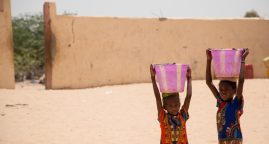Aleppo: ICRC calls to stop violence
In a further day of devastation in Aleppo, another four medical facilities on both sides of the frontlines have been hit, causing extensive damage.
As hundreds of shells, bombs and mortars continue to rain down on the city, killing more civilians, the International Committee of the Red Cross calls for an immediate halt in the attacks.
“There can be no justification for these appalling acts of violence deliberately targeting hospitals and clinics, which are prohibited under International Humanitarian Law. People keep dying in these attacks. There is no safe place anymore in Aleppo. Even in hospitals,” said Marianne Gasser, head of the ICRC in Syria. “For the sake of people in Aleppo, we call for all to stop this indiscriminate violence.”
Dozens of people have died and been injured in another day of relentless fighting in Aleppo today. The health-care facilities which have been hit today are: Al Marjah polyclinic, the Bustan Al Qassar polyclinic and Shawki Hill Dialysis Centre and the Ibn Rashid Cardiac Hospital.
The attacks follow the destruction overnight on Thursday of the Al Quds hospital, with significant loss of life among patients and medical staff.
Many thousands of Aleppo residents have been subjected to constant shelling and clashes and the ICRC has warned that in the intensification of fighting over recent days, millions of people are facing humanitarian disaster as it becomes increasingly difficult to reach them with aid.
Article published on ICRC website
Related Articles
Giving Away Billions as Fast as They Can
10/20/2017. Many new philanthropists appear less interested in naming a business school after themselves than in changing the world.
Local aid agencies: still waiting for a bigger share of the funding cake
03/27/2017. Donors and UN agencies who agreed to provide at least one quarter of humanitarian aid funding “as directly as possible” to local NGOs are struggling to deliver on their pledge.
The “New Way of Working”: Bridging aid’s funding divide
06/09/2017. The so-called New Way of Working (NWOW) has, according to its champions, the potential to radically improve how emergency relief programmes are designed and delivered.






